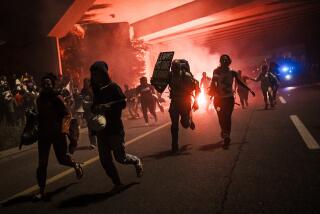Egypt protesters demand that Mohamed Morsi step down
CAIRO — Tens of thousands of Egyptians broke through barbed wire and marched to the presidential palace Friday demanding that President Mohamed Morsi step down even as government officials appeared to offer a slight concession on a controversial proposed constitution.
“Leave, leave like Mubarak!” protesters chanted, referring to Morsi’s predecessor, longtime autocrat Hosni Mubarak.
Many protesters outside the palace no longer asked for Morsi to rescind a decree last month that expanded his powers and postpone a referendum scheduled Dec. 15 on a proposed charter written by an Islamist-dominated assembly. They demanded his resignation in what has become the sharpest political crisis since last year’s overthrow of Mubarak.
Protesters said they were upset by Morsi’s televised address Thursday, during which he offered a “national dialogue” with opposition leaders but remained adamant about the referendum and kept his unpopular decree in place.
In response to protests that have spread across the country, Vice President Mahmoud Mekki announced that Morsi was willing to postpone the constitutional referendum if the opposition agreed not to challenge the document in court. The government, in another effort to calm the crisis, announced that it would delay the early start of voting on the referendum for Egyptians living abroad from Saturday until Wednesday.
Analysts said the government’s announcement may have been an attempt by Morsi to allow time for negotiations with opposition leaders.
“Morsi underestimated the opposition,” said Ziad Akl, senior analyst at Al Ahram Center for Political and Strategic Studies. “After witnessing the protesters break through the barbed wire to surround the palace, he realized that he had to make some kind of concession.”
Opposition leaders had not responded to government officials by late Friday. They have said the opposition is not willing to negotiate until the president revokes his “dictatorial” constitutional decree and postpones the referendum.
At least six people have died and hundreds have been injured in clashes that began Wednesday between Islamist supporters of Morsi and protesters from mainly secular opposition movements.
The civil strife has been the bloodiest the country has witnessed since last year’s uprising that toppled Mubarak. Morsi and the Muslim Brotherhood have refused to retreat as the opposition promised more protests.
“Morsi has lost all legitimacy in the eyes of the people, especially after yesterday’s speech. As a leader, he is responsible for those who died,” Waleed Essam, a 30-year-old artist, said as he waved a large white banner with the image of one of the protesters killed in the recent violence.
“He didn’t even acknowledge that those who died were revolutionaries. He spoke 24 hours after the violence. This is not a president for Egyptians,” Essam said.
Tamer Sherif, a 38-year-old engineer protesting outside the palace, said Morsi must go because “he is a president for the Brotherhood.”
“He didn’t respect the judiciary, the people or the constitution,” Sherif said. “He wants to turn the country into a Brotherhood nation.”
More than 20 political parties and opposition movements called for Friday’s protests against Morsi. The groups said Morsi’s legitimacy as president “fell as the blood of revolutionaries” fell during the clashes.
Thousands of Morsi’s supporters marched in the afternoon after holding funeral prayers for victims of Wednesday’s violence in Al Azhar mosque.
Abdellatif is a special correspondent.
More to Read
Start your day right
Sign up for Essential California for news, features and recommendations from the L.A. Times and beyond in your inbox six days a week.
You may occasionally receive promotional content from the Los Angeles Times.






